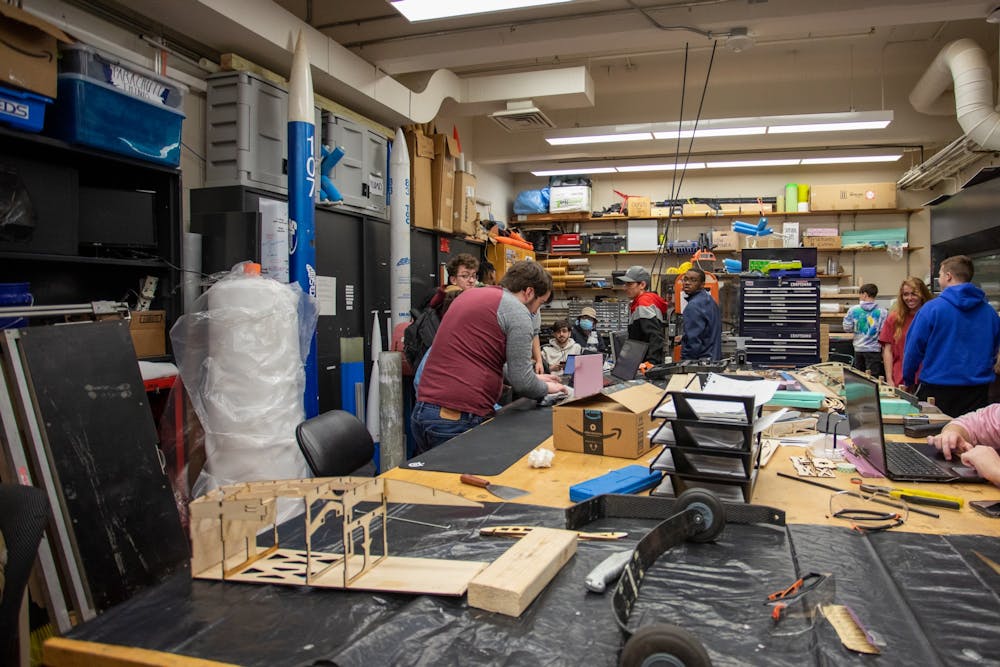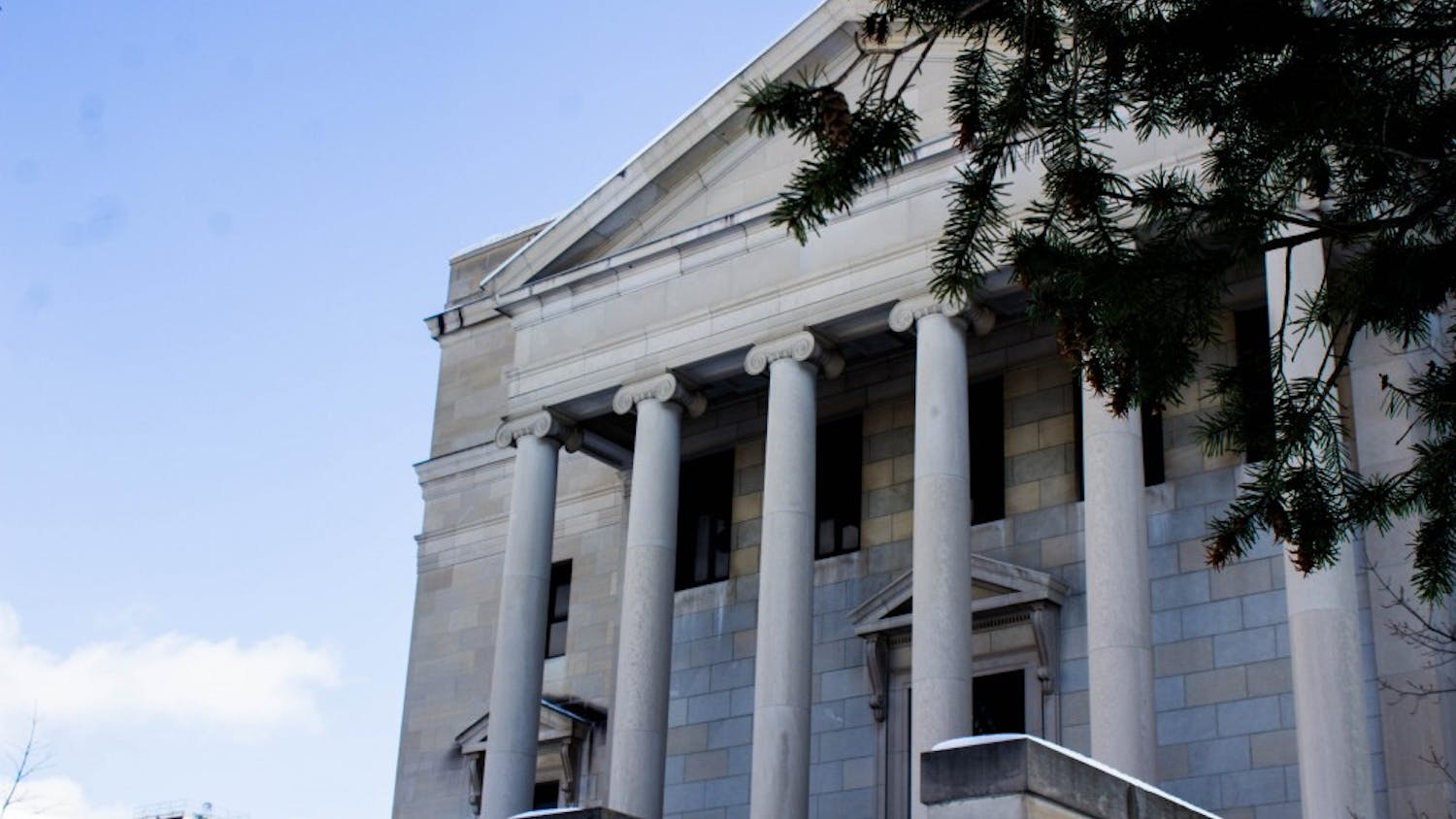Last September, Kaelyn Button was ready to begin her second year as president of UB’s Swim Club and return to in-person swim meets after a year of strict COVID-19 rules.
Months later, she considered resigning.
It all came to a head when the Swim Club hosted a meet with approximately 150 competitors in attendance. More than a month before, Button, a junior biomedical engineering major, had hired four officials affiliated with U.S. Masters Swimming (USMS), the governing body which oversees adult swim clubs, to facilitate the meet.
The officials asked for advance payment, so Button requested the payments through the Student Association, the undergraduate student government that oversees over 150 undergraduate student clubs and their budgets. Button says SA employees told her “multiple times” that the advanced checks would be approved.
But when Button went to pick up the checks the day before the meet, SA Treasurer Austin Wolfgang told her that SA could not make an advance payment at that point. She attempted to pay the officials out of her own pocket — $200 in all — but a UB Athletics official told her that would be illegal.
The officials agreed to run the meet despite the lack of up-front payment. But after two weeks of still having not received payment, one official emailed Button to tell her that he was “very upset” and that she “just does not care.”
Button wrote back apologizing and explaining that the situation was out of her hands. In his reply, the official told her that he would consider resorting to “legal pressures” and that USMS would “never assist [UB Swimming] Club again,” which would preclude the club from hosting any meets moving forward.
Button cried in the library after reading his email.
Button eventually resolved the matter. She forwarded the email to Wolfgang, who cited an intra-office miscommunication for the delay and promptly processed the paperwork. Another USMS official told her that the official she was working with was speaking out of line and USMS would continue to oversee their meets.
“[SA] did get [it] done eventually, but not before these people that are respected in the swim community got really mad at me and didn’t want to come here [to UB] to help us anymore,” Button said. “Because SA took so long, it was a really stressful experience for me.”
The delayed payments were simply the latest episode in continuing problems with SA, according to Button. The SA didn’t pay for swim caps the club ordered in November until March. The SA failed to book a hotel room for an away meet, forcing Button and four other swimmers to split the cost of an Airbnb. And they still haven’t paid the club’s league membership fees, preventing qualifying UB swimmers from attending the national competition.
Button’s experiences have even inspired her to write a “Swim Club for Dummies” guide for future e-board members.
“It just seems like everything is very unclear,” Button said. “Jobs get passed around up there [in the SA office] and nobody is communicating with each other.”
And the Swim Club isn’t alone. Club e-boards ranging from engineering associations to sports teams to dance groups told The Spectrum that they’ve grown frustrated with what they see as cryptic guidelines, frequent logistical errors and a lack of communication from SA.
Students for the Exploration and Development of Space say they lost two weeks of building time on their rocket while navigating an ambiguous vendor relations agreement between a retailer and SA.
Women’s ice hockey President Anne Malcolm, a senior psychology and health and human services major, is worried that the team’s games won’t have referees because of months of outstanding payments.
The SA sent important emails to previous, but not current, e-board members of the Impulse Dance Force, causing the club to miss out on fundraising and community service opportunities.
The club leaders all agreed on one thing: the SA doesn’t have a personnel problem. It has a structural problem — dating back years.
“I don’t necessarily think it’s individual people who are just not answering their emails,” Jenna Bradshaw, a junior environmental studies and political science major and vice president of Impulse, said. “Our questions aren’t getting to the right people to give us answers. There’s just no clear flow of information.”
Wolfgang described much of the criticism from clubs as “fair,” citing fall semester staffing issues, organizational impediments, annual staff turnovers and a lack of “face time with clubs” for much of the confusion.
“That’s one of the things I think people kind of forget about SA: We’re also running a company,” Wolfgang said. “We have 70 student employees, I’ve got to make sure they get paid. Being overwhelmed is a huge thing in the finance department.”
The SA funds clubs — alongside other extracurricular activities and services — through the annual $109 student activity fee paid by all undergraduate students.
The association’s annual budget totals $4,679,806. Much of that money is divided and distributed toward individual clubs, theoretically allowing e-boards to use the funds to pay for club activities and bills.
But in practice, red tape and communication issues can prevent clubs from accessing those funds, sometimes making club operations much more difficult.
For example, Mark SanGregory, a junior aerospace engineering major and treasurer of the American Institute of Aeronautics and Astronautics at UB, ordered “a very large amount of carbon fiber” in late October for the club’s build competition which was set for April.
The vendor initially refused to sell to a university-affiliated organization because they’re “awful to work with,” but SanGregory convinced him. SanGregory made sure all the paperwork was complete, put in a purchase order and confirmed that the SA had everything they needed to pay by check.
By late December, the carbon fiber still hadn’t arrived. SanGregory reached out to an SA pro-staff member, who told him he needed an itemized invoice for the order to be approved.
The vendor couldn’t provide SanGregory with an invoice since the order hadn’t been finalized, but they did provide him with a quote, which SanGregory forwarded to the SA.
SanGregory never heard back, so he stopped by the SA office at the beginning of the semester. The SA wouldn’t accept the quote, not even after the vendor changed its title to read “invoice.”
SanGregory was never able to use AIAA’s budget to pay for the carbon fiber. Someone in the mechanical and aerospace engineering department put it on their credit card in early February instead. AIAA got the carbon fiber two days later.
Even so, the club lost the time they needed to build “three or four” prototypes and practice working with carbon fiber.
“I’m not blaming students for not knowing financial law,” SanGregory said. “It’s not their job. We’re all students here… [But] I was very upset after that. Because at any point during this three-month-long back and forth with this company, after they accepted the PO [payment order], they could’ve just called the company…Take ownership of us, treat us like a club under them, rather than a club working for them.”
Some of the policies that have made clubs “very frustrated” — like restrictions on advance payments, requirements that the SA pay only by check and rules that clubs record attendance at every single meeting on UBLinked — come from SUNY or UB, Wolfgang said. But the SA is working on reforms which should solve some clubs’ issues with SA, including creating a “procurement department” to help clubs work with vendors, loosening restrictions on hotel bookings, getting an SA credit card for certain transactions and more.
“You’re never going to get a non-bureaucratic SA; we’re a student government regulated by the university and SUNY,” Wolfgang said. “I believe the bureaucracy is too much for our clubs to deal with, but at the end of the day, there has to be bureaucracy. We have to make sure we’re being judicious. I mean, you can go back and see the scandals SA has been involved in with our money [in the past]. It’s definitely a very tricky point, and I’ve tried to lower [the amount of red tape] for some clubs.”
At least according to Bradshaw, SA reforms are going to have to come from within.
“We’re all students too, and we all have a lot of things going on,” Bradshaw said. “We’re just focusing on what’s best for our club. I can’t focus on lobbying for structural change within SA… But I feel like that is kind of the point of having a staff on SA. It’s supposed to be set up so that someone is overseeing these things, listening to clubs, taking in feedback and trying to fix things. It shouldn’t be on us to say, ‘Hey, this isn’t working.’”
Grant Ashley is a senior news/features editor and can be reached at grant.ashley@ubspectrum.com

Grant Ashley is the editor in chief of The Spectrum. He's also reported for NPR, WBFO, WIVB and The Buffalo News. He enjoys taking long bike rides, baking with his parents’ ingredients and recreating Bob Ross paintings in crayon. He can be found on the platform formerly known as Twitter at @Grantrashley.





